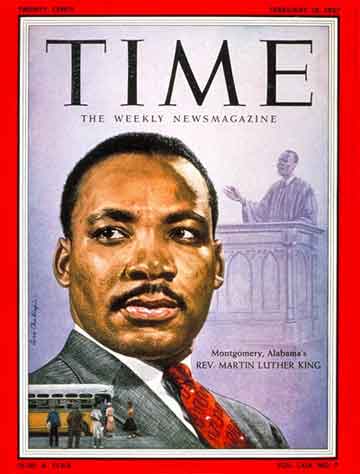
Montgomery Alabama's Rev. Martin Luther King
(7 of 10)
Montgomery's Negroes walked back through the night to their homes. "I'll be honest with you," says a policeman who was there. "I was terrified. I owe my life to that nigger preacher, and so do all the other white people who were there."
Voice from Washington. After the bombing, Montgomery Negroes put up floodlights around King's home and refused to let him drive or walk alone. The Kings moved most of their furniture into back rooms, leaving the living room virtually bare. King briefly considered arming himself, but decided against it ("As the leader of a nonviolent movement, I'd look pretty bad carrying a gun"). Coretta King took their infant daughter to Atlanta, but soon returned. "When I'm away from this," she says, "I get depressed. I feel completely helpless."
The boycott continued, bringing the bus company to its economic knees. King and 89 other boycott leaders were indicted on charges of violating a 1921 antiboycott law that came straight from Alabama's legal boneyard (King's $500 fine is still under appeal). Then Montgomery's officials made a stab that very nearly paid off. They went to court for an injunction against the M.I.A. on the ground that it had set up an illegal transit system.
The move was one that King had long feared; he had, in fact, tried to forestall it by having the name of a different Negro church printed on the side of each of the 20 new station wagons that the M.I.A. had bought for the car pool. One day last November as King and his M.I.A. colleagues were in court fighting a losing battle against the injunction, there was a stir among the white lawyers. They had seen a news dispatch: the U.S. Supreme Court had declared bus segregation illegal in Montgomery. Cried a fervent Negro: "God Almighty has spoken from Washington, D.C.!"
The next night King addressed an emotion-packed church meeting ("Look at the way they greet that guy," said a white newsman. "They think he's a Messiah"), admonished his followers to take their victory humbly. "I would be terribly disappointed," said King, "if any of you go back to the buses bragging, 'We, the Negroes, won a victory over the white people.' "
